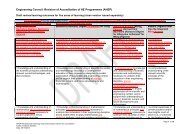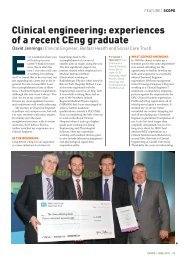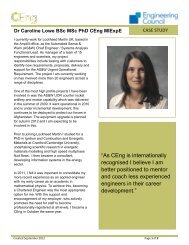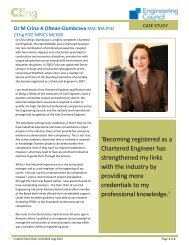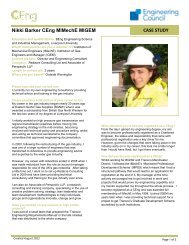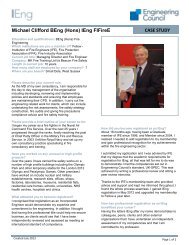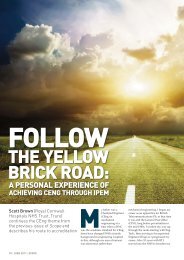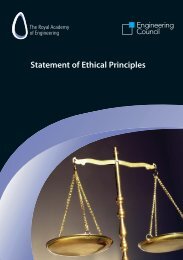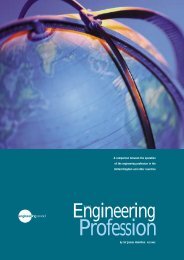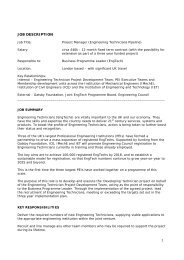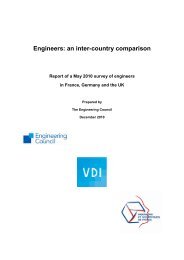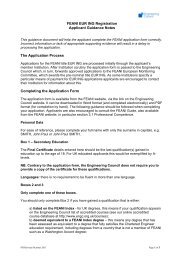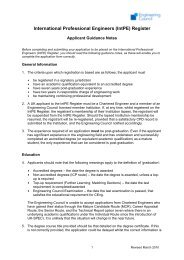An Engine for Change - A Chronicle of the Engineering Council
An Engine for Change - A Chronicle of the Engineering Council
An Engine for Change - A Chronicle of the Engineering Council
Create successful ePaper yourself
Turn your PDF publications into a flip-book with our unique Google optimized e-Paper software.
232A CHRONICLE OF THE ENGINEERING COUNCIL(large) engineering Institutions and <strong>the</strong> <strong>Engine</strong>ering <strong>Council</strong>. It is not clear that <strong>the</strong> re<strong>for</strong>med<strong>Engine</strong>ering <strong>Council</strong> is any more effective than <strong>the</strong> old - ra<strong>the</strong>r to <strong>the</strong> contrary.Pr<strong>of</strong>essor John CaldwellWith hindsight I have one over-riding view which affects almost everything within <strong>the</strong>environment called <strong>the</strong> <strong>Engine</strong>ering <strong>Council</strong> and whilst Sir William Barlow said this many,many years ago, I find it worryingly still true and very much responsible <strong>for</strong> manyfrustrations which have inhibited <strong>the</strong> direction and influence <strong>of</strong> <strong>the</strong> <strong>Engine</strong>ering <strong>Council</strong>.When I look at <strong>the</strong> four senior Presidents who finalised <strong>the</strong> negotiations with Sir JohnFairclough <strong>for</strong> <strong>the</strong> shape <strong>of</strong> <strong>the</strong> new <strong>Engine</strong>ering <strong>Council</strong> it is clear that subsequently when<strong>the</strong>y were no longer Presidents <strong>of</strong> <strong>the</strong>ir Institutions <strong>the</strong> messages and actions from “<strong>the</strong>ir”Institutions were very different than at <strong>the</strong> time <strong>of</strong> negotiation and agreement.It seems to me that <strong>the</strong> President <strong>of</strong> an Institution <strong>the</strong>se days does not necessarily speak at all<strong>for</strong> <strong>the</strong> deep held views <strong>of</strong> his Institution and many <strong>of</strong> his speeches are personal and arecertainly not supported by a large majority <strong>of</strong> his membership and this has been particularlytrue in <strong>the</strong> last 2 or 3 years within <strong>the</strong> Institution <strong>of</strong> Civil <strong>Engine</strong>ers.We <strong>the</strong>re<strong>for</strong>e have a very odd situation where agreements to proceed within <strong>the</strong> general“environment <strong>of</strong> engineering” are made by specific individuals who held <strong>the</strong>ir post asPresident <strong>for</strong> one year and <strong>the</strong>n are by no means followed up and supported by <strong>the</strong>ir particularInstitutions shaping <strong>the</strong> detail where, as Sir John Fairclough said, “<strong>the</strong> devil lies”.Fur<strong>the</strong>rmore, <strong>the</strong> top-down Government responsibility via <strong>the</strong> DTI is also similarly dependentupon particularly transient Ministers and Civil Servants and <strong>the</strong>re<strong>for</strong>e when an agreement ismade between everybody concerned, it is strange that <strong>the</strong> people who made it do notnecessarily have to carry it out in <strong>the</strong> spirit in which it was conceived.Brian KentSenatorI was well aware <strong>of</strong> <strong>the</strong> background <strong>of</strong> <strong>the</strong> <strong>Council</strong> and <strong>the</strong> process that had been taking place(The Fairclough Initiative) begun by Sir John Fairclough. I was unaware <strong>of</strong> <strong>the</strong> deepremaining disagreements between engineering institutions concerning Unification and <strong>the</strong>future role <strong>of</strong> <strong>the</strong> <strong>Council</strong>. I was also unaware <strong>of</strong> <strong>the</strong>ir suspicions that a hidden agendaremained to amalgamate <strong>the</strong>m. Sir John Fairclough later acknowledged to me his concernthat, had I known, I might have hesitated be<strong>for</strong>e accepting <strong>the</strong> job.It also transpired that completion <strong>of</strong> arrangements on <strong>the</strong> way ahead was not nearly as far<strong>for</strong>ward as I had been led to believe. As examples, <strong>the</strong> new Royal Charter was still far fromagreed and we were extremely hard pressed to complete <strong>the</strong> work in time <strong>for</strong> <strong>the</strong> launch <strong>of</strong>Unification and <strong>the</strong> New <strong>Council</strong> at <strong>the</strong> beginning <strong>of</strong> 1996. Also, no thought had been givento organising an event to mark <strong>the</strong> launch and it proved very difficult to book a major Londonvenue in <strong>the</strong> time available. None <strong>of</strong> <strong>the</strong> major Institutions was prepared to help, judging <strong>the</strong>notice to be too short and <strong>the</strong> funding inadequate. I could not help noticing an element <strong>of</strong>unholy glee at our predicament!It was clear that <strong>the</strong>y saw nothing to celebrate in Unification, one <strong>of</strong> <strong>the</strong>m still refusing toaccept <strong>the</strong> word even after <strong>the</strong> thousands <strong>of</strong> hours <strong>of</strong> discussion to arrive at <strong>the</strong> famous© <strong>Engine</strong>ering <strong>Council</strong> UK 2004



